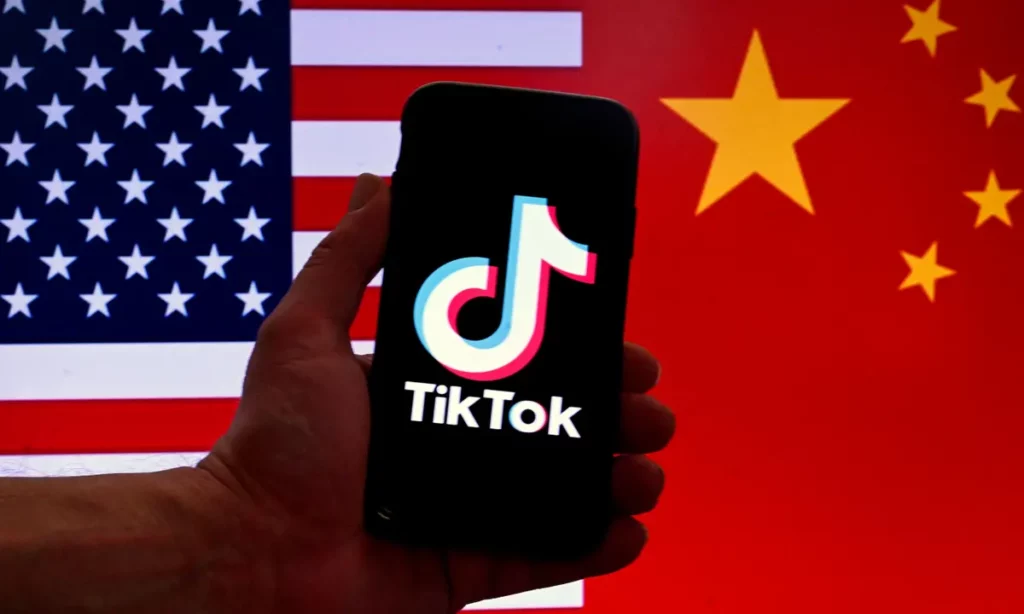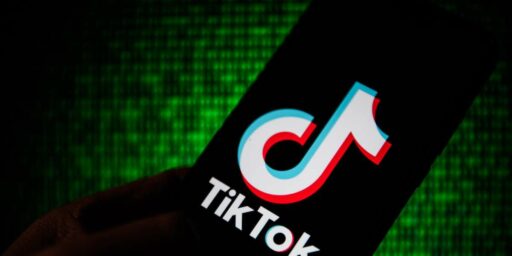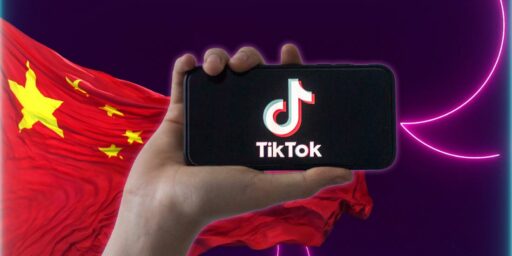TikTak Ban Close. Is it Constitutional?
The courts would likely allow restricting a Chinese data mining operation popular with American teenagers.

POLITICO (“An updated TikTok bill changes the game in Washington“):
A bill to potentially ban TikTok could be passed and signed into law as soon as next week, depending how quickly the Senate moves — which would mark a sharp ending to four years of attempts by two presidents to curtail the influence of the Chinese-linked app.
If President Joe Biden signs the bill as promised, it would mark an abrupt close to a frantic and high-powered pressure effort by the popular social media app to stop the bill. So far, the company’s efforts to deploy the clout of its users, including urging TikTokers to swamp lawmakers’ phones and bringing creators to Capitol Hill, have largely backfired.
A direct effort by Chinese diplomats to lobby Hill staffers, reported by POLITICO, instead only hardened the sense of Washington China hawks that the app was a dangerous proxy for Beijing.
With the House of Representatives set to pass the TikTok bill as part of a major aid package over the weekend, the ball would be in the Senate’s court, where friction already seems much lower than it was in March, when the TikTok bill first moved through the House.
If the bill passes, TikTok is then expected to shift its fight to the courts, arguing the law is unconstitutional, unfairly targeting a single company and violating the First Amendment.
[…]
The House’s TikTok bill was wrapped this week into a set of large aid and national security bills to support Ukraine, Israel and Taiwan, considered priority legislation for Senate Majority Leader Chuck Schumer. The House could approve the package and send it to the Senate as early as this weekend.
Already, Senate friction seems to be vanishing. Senate Commerce Committee Chair Maria Cantwell, who earlier had said the bill likely wouldn’t hold up in the courts, now says she supports the updated version. The original version had called for a forced sale within six months, and the new version extends that timeline up to a year.
“As I’ve said, extending the divestment period is necessary to ensure there is enough time for a new buyer to get a deal done,” Cantwell (D-Wash.) said this week. “I support this updated legislation.”
[…]
One potential sticking point: Sen. Rand Paul (R-Ky.), who has opposed the bill from the start as government overreach, and has First Amendment concerns for the 170 million Americans who could potentially lose access to the app. He also opposes the larger foreign aid package the bill is now attached to.
He could block the bills if they were brought up for an expedited unanimous consent vote or could filibuster them. To end a filibuster, Schumer would have to make a motion to invoke cloture, requiring 60 votes, to stop debate on the bill and bring it to a roll call vote.
Naturally, China is already retaliating:
In a sign of potential retaliation from a geopolitical rival, China reportedly ordered Apple to remove Meta’s WhatsApp and Threads from its app store Friday. While the move was largely symbolic — since both apps are already technically illegal in China — it hints that the door could be open for a wider crackdown on American companies.
I don’t have strong views on whether banning TikTok—or forcing its sale to a non-Chinese party—is good public policy. I’m skeptical of the alleged harm to national security. Still, they’re hardly without foundation.
Here’s what General Paul M. Nakasone, commander of U.S. Cyber Command and director of the National Security Agency, told Congress last April:
“If you consider one-third of the adult population receives their news from this app, one-sixth of our children are saying they’re constantly on this app, if you consider that there’s 150 million people every single day that are obviously touching this app, this provides a foreign nation a platform for information operations, a platform for surveillance, and a concern we have with regards to who controls that data.”
The danger is mostly theoretical but, certainly, the app has considerable reach. Rodman Ramezanian, Global Cloud Threat Lead at Skyhigh Security, contends “There’s Nothing Confusing About TikTok’s Security Risks.”
Nation states and security professionals alike are sounding the alarm. They see TikTok as significantly more risky than other apps, not only because of the quantity and type of data that it collects but also because of where that data is stored, what it could be used for, and who can ultimately access it.
[…]
According to its privacy policy, TikTok collects personally identifiable information (PII) that includes the user’s name, age, email, phone number, and social media account information. Additionally, it collects digital data, such as payment methods associated with transactions, social network contacts, IP addresses, geolocation data, and device information. And it collects biometric identifiers and biometric information, including faceprints and voiceprints from uploaded user content, as well as connected metadata.
[…]
Though TikTok denies that it would provide U.S. user data to the Chinese Communist Party (CCP), leaked audio from internal TikTok meetings show that U.S. user data has been repeatedly accessed from China, where ByteDance servers are located. Under China’s 2017 National Intelligence Law, TikTok, as a subsidiary of ByteDance, has a legal obligation to support CCP security and intelligence initiativesOpens a new window and could be compelled to exercise its access. Since the data is stored outside the U.S., American laws wouldn’t be enforceable, and TikTok would be in a position of policing itself.
[…]
In 2015, China announced its Digital Silk Road plan as part of its Belt and Road Initiative. The CCP sees data as a way to gain market advantage, power, and influence, as well as a way to develop machine learning models. The party went so far as to officially declare data as a national resource in 2019, on par with land, labor, capital, and technology.
It’s not a stretch to assert that the CCP could use its collected data sets for future applications and questionable purposes. A case in point is the former ByteDance executive who claimed that TikTok was being used by the CCP to spread propaganda and hateful content. He was promptly fired for misconduct and has since filed a wrongful termination complaint against ByteDance.
NYT national security reporter David E. Sanger argues “TikTok’s Security Threats Go Beyond the Scope of House Legislation.”
In the four years this battle has gone on, it has become clear that the security threat posed by TikTok has far less to do with who owns it than it does with who writes the code and algorithms that make TikTok tick.
Those algorithms, which guide how TikTok watches its users and feeds them more of what they want, are the magic sauce of an app that 170 million Americans now have on their phones. That’s half the country.
But TikTok doesn’t own those algorithms; they are developed by engineers who work for its Chinese parent company, ByteDance, which assembles the code in great secrecy in its software labs, in Beijing, Singapore and Mountain View, Calif. But China has issued regulations that appear designed to require government review before any of ByteDance’s algorithms could be licensed to outsiders. Few expect those licenses to be issued — meaning that selling TikTok to an American owner without the underlying code might be like selling a Ferrari without its famed engine.
[…]
No one was contemplating the possibility that Chinese engineers could design code that seemed to understand the mind-set of American consumers better than Americans did themselves. By the millions, Americans began to put Chinese-designed software, whose innards no one really understood, on their iPhones and Androids, first for dance videos, then for the memes and now for news.
It was the first piece of Chinese-designed consumer software to go wildly viral across the United States. No American firm seemed capable of displacing it. And so it wasn’t long before its ubiquity raised worries about whether the Chinese government could use the data TikTok collected to track the habits and tastes of American citizens. Panicked, state governments across the United States started banning the app from state-owned phones. So did the military.
But officials know they cannot wrest it from ordinary users — which is why the threat of banning TikTok, especially in an election year, is faintly ridiculous. In a fit of remarkable candor, Gina Raimondo, the commerce secretary, told Bloomberg last year that if any democracy thinks it can outright ban the app, “the politician in me thinks you’re going to literally lose every voter under 35, forever.”
Political impact and wisdom as public policy aside, I strongly suspect that it would survive judicial challenge. While there have only been a relative handful of big cases, the Supreme Court has recognized national security exceptions to the First Amendment for more than a century. The question will mostly be whether the severity of the restriction here is reasonable to mitigate the alleged risk. I would think the courts would defer to the judgment of elected policymakers in that regard.
That’s especially true, I would think, given that TikTik is a Chinese entity (owned by a company called ByteDance) and indirectly controlled (as with any large enterprise in the country) by the Chinese Communist Party. The restriction on the freedoms of US persons here is relatively minimal: there are plenty of other platforms for sharing memes.






Could you elaborate on that comment? The rest of the article seems to contradict it.
While this is objectively true, I think the feelings of resentment in the very many people who make the app a part of their daily lives at the moment would be hard to overstate. Their social networks would not magically reform intact on some new host app.
Without strong data privacy laws, and an enforcement mechanism, there is nothing to prevent China from just buying all the information anyway.
And China having a way to broadcast to all of American teenagers (not broadcast, exactly, but tweak algorithms to make sure they see videos about Foo) is no worse than Elon Musk doing that.
@Gustopher: Impressive Lefty Musk derangement to see as equivalent the focused direction of an unfriendly state actor (PRC under Xi Jinpig) and the erratic foolishness of a single entrepreneur – Musk. Something of a comic book level of analysis.
@DrDaveT: It’s theoretical in the sense that it’s not clear that the CCP is doing anything malign with the information. But the possibilities are certainly substantial.
@Gustopher: Musk isn’t our chief strategic competitor.
They’re banning breath mints now?